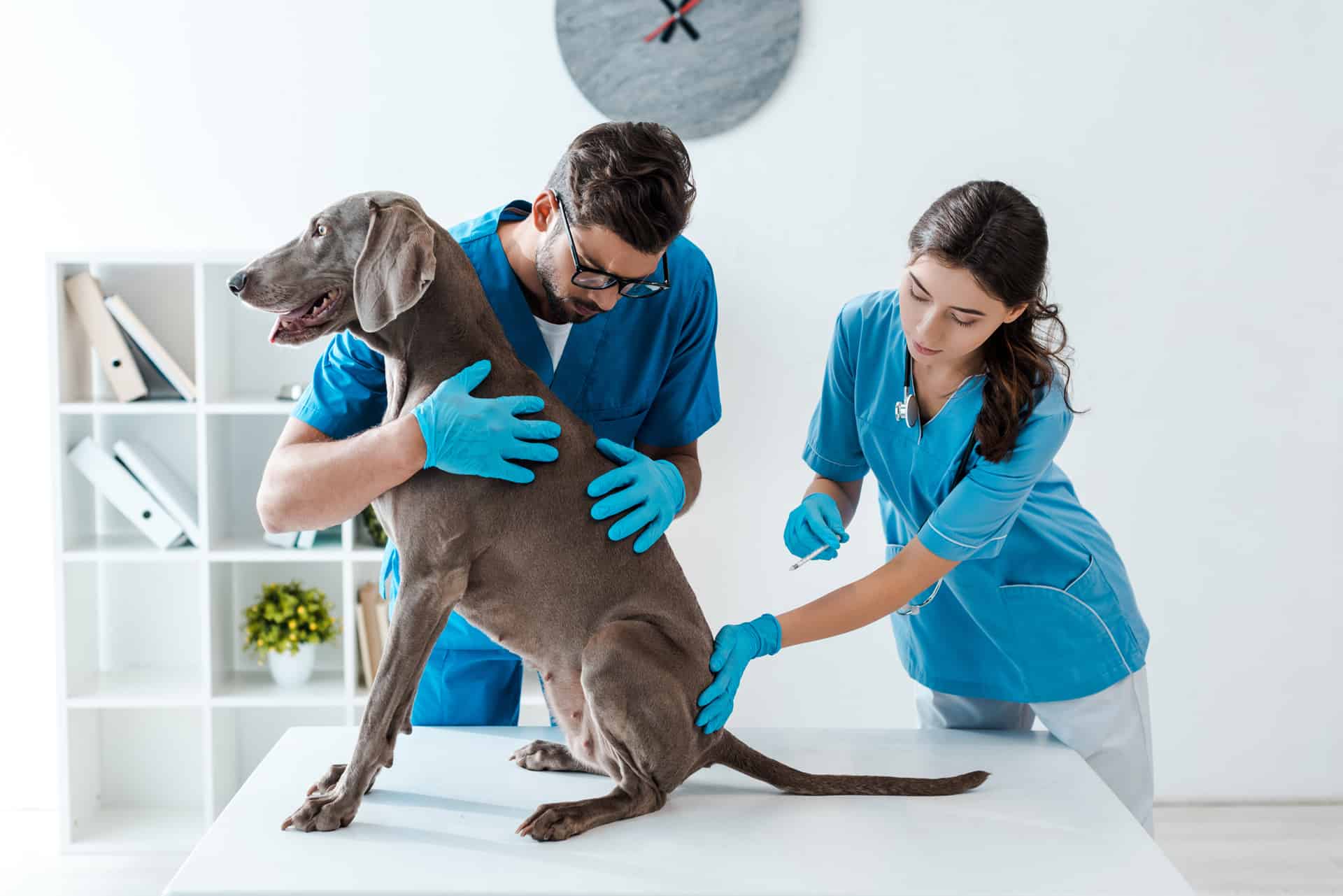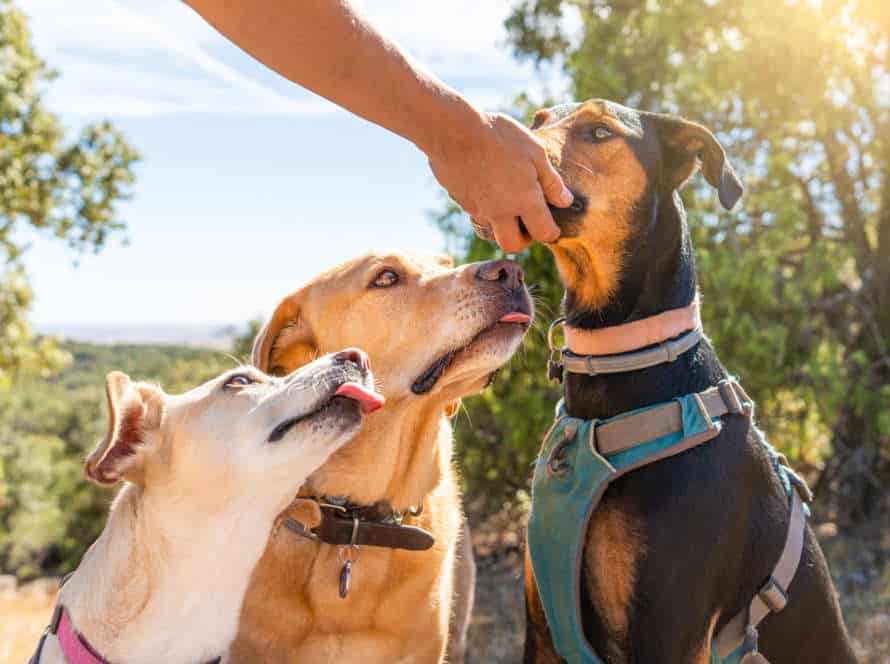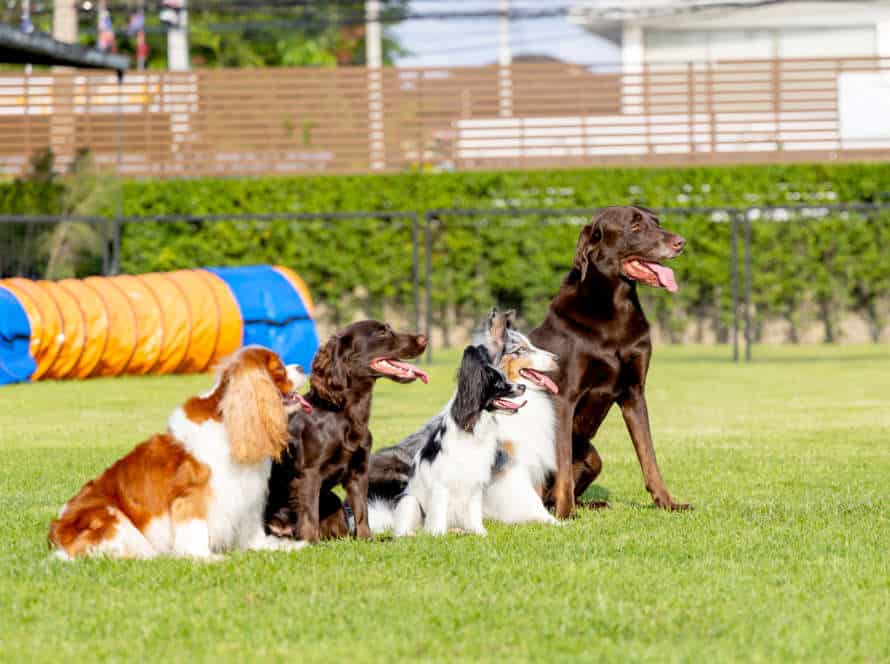Why Vaccinating Your Adult Dog is Important
It’s essential for responsible pet owners to vaccinate their adult dogs. Vaccinations can help keep them safe from diseases and provide a longer, healthier life. You need to learn about why each vaccination is important, and how to pick the right ones for your pup. Here are the deets!
Understand the Benefits of Vaccinating Your Pet
Vaccinating your pup is a must, for their health and wellbeing. Here are some prime perks:
- Protection from serious sicknesses: Vaccines protect dogs from life-threatening diseases, like distemper, parvovirus and rabies.
- Preventing certain infections: Vaccines ward off infections that bring chronic illnesses or pricey treatments.
- Cost-effective: Preventative shots cost less than treating illnesses that could’ve been prevented.
- Mandatory by law: Some states require pets to have up-to-date vaccinations, including rabies.
- Keeping your community safe: Vaccinating your dog can stop infectious diseases from spreading to other animals and humans.
- Pro tip: Ask your vet for a vaccine schedule that suits your dog’s needs and lifestyle.
Learn about the Legal and Moral Obligations of Pet Vaccinations
Pet vaccinations are essential. Not just for legal reasons, but also for moral ones. They protect your dog from diseases such as distemper, parvovirus, rabies, and hepatitis. These illnesses can be passed to other animals and humans.
Depending on where you live, there could be legal requirements for vaccinations. If not followed, penalties, fines, and legal action could occur.
Besides the legal aspect, pet owners have a moral responsibility to vaccinate. It helps keep our furry pals safe, and stops diseases from spreading to other pets.
For best results, talk to your vet. They’ll tell you what vaccines are needed, depending on your pet’s age, health, and lifestyle. Boosters may also be required to keep the protection going.
Know the Risks Associated with Non-Vaccination
Vaccinating your adult doggo is essential for their health and safety. But, not vaccinating can be risky! Non-vaccination can be bad for your pup’s health and even life-threatening.
Here are the consequences of not vaccinating:
- Unvaccinated dogs can catch and spread diseases like parvo, distemper, and rabies. These can cause serious symptoms, and even death.
- Unvaccinated doggos can pass viruses to other doggos, putting them in danger too.
- Non-vaccinating can get you into legal trouble–many states require rabies vaccinations by law.
- Not vaccinating can lead to costly medical bills and even euthanasia in extreme cases.
Therefore, make sure your adult pup is up-to-date with all the necessary vaccinations!
Common Adult Dog Vaccinations
It is important to keep your grown-up dog current on vaccines. This helps to stop the spread of contagious illnesses. Rabies, distemper, bordetella and canine influenza are some common vaccinations for adult dogs. Let’s look at each one and understand why they are so important.
Distemper
Distemper is highly contagious. It can infect both pups and adult dogs. Vaccines are an effective way to prevent it.
These vaccines protect against serious diseases like parvo, hepatitis and rabies.
Talk to your vet to find out when you should vaccinate your dog – yearly or every three years. Vaccinating your dog keeps it healthy and stops the spread of the disease. Pro tip: Consult your vet to find out which vaccines your dog needs.
Parvovirus
Parvovirus is a highly contagious and deadly dog disease, especially in puppies. Proper vaccinations can prevent it. The vaccine is usually included in the distemper combination vaccine, alongside other canine diseases like distemper and adenovirus.
Adult dogs need a booster shot every one to three years, depending on their individual health and risk factors. Vaccinating your dog not only keeps them safe, but also helps stop the virus from spreading to other dogs in your area.
Other common adult dog vaccinations are rabies vaccine, Bordetella vaccine (for kennel cough), and leptospirosis vaccine. Talk to your vet to decide the best vaccination schedule for your pup, based on age, health, and lifestyle.
Adenovirus
Adenovirus is a common virus, which can affect the respiratory and digestive system of dogs. Thus, adult dog vaccinations are necessary to keep your pet healthy.
Adenovirus has two types: type 1 and type 2. Type 1, or canine hepatitis, can cause liver damage, fever, and abdominal pain. Type 2 causes respiratory symptoms such as coughing, sneezing, and fever, and can lead to pneumonia.
To protect your adult dog, vaccines are available. They cover both types of adenovirus and can be given alone or with a combination vaccine protecting against other diseases.
Vaccinating your adult dog can help prevent severe illness, reduce the spread of the virus, and ensure your pet has a healthy and happy life.
Rabies
Rabies is a contagious, viral disease that affects mammals, like dogs. It is deadly, if not treated. Vaccinating your adult dog is crucial to keep them healthy and avoid the spread of the disease.
Most countries make rabies vaccination necessary. It’s also wise to vaccinate your dog yearly. Keeping up-to-date records, and storing them securely, is also essential.
Although, there can be mild side effects such as fever and fatigue, the benefits of rabies vaccination outweigh the risks. Vaccinating your dog protects their health and safeguards your family and community from this hazardous disease.
Pro tip: Speak to your vet to choose the best vaccination plan for your dog. Ask any questions or worries you have about their health.
Other Adult Dog Vaccinations and Considerations
Be a responsible pet owner and vaccinate your pet. Besides the core vaccines, there are other vaccinations that should be given to adult dogs. This article looks at these additional vaccinations and what to think about when choosing them.
Lyme Disease
Lyme Disease is a bacterial infection that can infect both humans and dogs. It’s usually spread through ticks that carry the bacteria. Symptoms in dogs include: lethargy, lameness, and fever. Treatment for Lyme Disease consists of antibiotics. Prevention is key to keep your pet healthy.
Vaccinations are essential for protecting your pet from deadly diseases. Talk to your vet about a vaccination schedule tailored to your dog.
Plus, regular tick check-ups and preventive treatments such as tick collars or spot-on treatments can help protect your pup from Lyme Disease and other tick-borne illnesses.
Leptospirosis
Leptospirosis is a bacterial infection that can affect both dogs and humans. It spreads through contaminated water or soil, which can cause serious health issues. Vaccination is the most effective way to prevent leptospirosis in adult dogs.
Other adult dog vaccinations include:
- Rabies: Required by law in most states to protect against a fatal viral disease transmissible to humans.
- Distemper: A highly contagious and potentially fatal airborne virus that attacks respiratory, nervous and gastrointestinal systems.
- Parvovirus: A highly contagious and potentially fatal viral disease that attacks a dog’s gastrointestinal system.
- Bordetella: Also known as kennel cough, this highly contagious respiratory disease is more common among dogs regularly exposed to other canines.
These adult dog vaccinations can help keep your pet healthy and protected. Vaccination schedules may vary depending on your location, veterinarian’s advice and your pet’s lifestyle.
Canine Influenza
Canine Influenza is a highly contagious respiratory illness which affects dogs of all ages, breeds, and sizes. Vaccinating your pup against this potentially deadly virus is one of the best ways to protect them.
Aside from the Canine Influenza shot, there are other vaccinations for adult dogs to consider. These include Rabies (mandatory for all dogs), Bordetella (protects from Kennel Cough) and Lyme Disease (protects from tick-borne bacteria).
It’s important to speak with your vet about your pup’s lifestyle and health history. This will help to decide which vaccinations are necessary. Other measures to keep your pup healthy include: feeding a balanced diet, regular exercise and regular vet check-ups.
Adult Dog Vaccination Schedule
Adult pooches require regular vaccinations to stay healthy. Vaccines protect against serious sickness that can be hazardous for both you and your pup. To make sure your dog gets the needed vaccinations, comprehending and following an adult dog vaccination schedule is important. In this article, we’ll cover the types of vaccinations your dog should receive and when they should be administered.
Determine the Right Vaccination Schedule for Your Adult Dog
Keeping your adult dog healthy is key. So, finding the right vaccine schedule is important. It depends on your pup’s age, health, lifestyle and risk of exposure to certain diseases.
Vets generally recommend these adult dog vaccines:
- Rabies – a virus that harms both dogs and humans. By law, most states require this one.
- Distemper – virus affects pup’s respiratory, GI and nervous systems.
- Parvovirus – this virus is serious, causing dehydration and diarrhea and even death.
- Hepatitis – it targets the liver causing severe damage.
- Bordetella – this bacterium causes kennel cough, a respiratory infection.
- Lyme – bacterial disease causes joint pain, fever and lethargy.
The vaccine schedule may change according to the pup’s age and health. Speak to your vet to get the right one for your adult dog.
Annual Wellness Exams
Annual wellness exams for adult dogs are a must for keeping them healthy. It also helps to detect any potential health issues early, and keeps their vaccinations up-to-date.
During the exam, your vet will check your dog’s weight, temperature, respiration, and heart rate. They will also inspect their ears, eyes, nose, mouth, coat, skin, and abdomen.
The vet will also assess their vaccinations and recommend booster shots if needed. These may include rabies, distemper, parvovirus, leptospirosis, and bordetella.
Annual wellness exams give you the chance to chat with the vet about your pet’s eating habits, behaviour, or any symptoms you might be concerned about. This conversation will help you understand their physical and mental health, and what you can do to keep them healthy and happy.
Pro tip: Scheduling an annual wellness exam with your dog’s vet saves you money in the long run, by preventing illnesses and reducing healthcare costs.
Vaccination Records and Certificates
It’s a must to keep your pup’s vaccine history and papers current. Here’s the vaccination routine for grown-up dogs:
- Rabies: This one is required by law. Give it to your pup from 12 weeks old, with yearly or tri-yearly boosters.
- DHPP (Distemper, Hepatitis, Parvovirus, and Parainfluenza): First shot at 6-8 weeks old, then boosters every 2-4 weeks until 16 weeks. After that, boosters every 1-3 years.
- Bordetella: This is for dogs that may come in contact with other doggies, like at boarding facilities or parks. Get it every 6-12 months.
- Leptospirosis: For outdoor or water-loving dogs. Get it yearly.
By monitoring their shots and giving boosters as suggested, you can help keep them safe from many diseases.
Preparing Your Adult Dog for Vaccination
Adult dogs need regular vaccinations to stay healthy. Preparing your dog for their vaccine can be less stressful. Follow these steps to get your pup ready!
- First, make an appointment with your vet.
- Next, ensure your dog gets enough food and exercise beforehand.
- Lastly, try to stay calm when taking them to the appointment.
Vaccinating an adult dog can be stress-free if you take these steps!
Schedule an Appointment with Your Veterinarian
Schedule an appointment with your vet – it’s a must for vaccinating your adult pup. Vaccines are key for protecting against various illnesses. Before giving them vaccinations, it’s important to chat with your vet about your pup’s medical past, current health, and any potential side effects.
At the appointment, your vet likely will do a physical exam and decide the ideal vaccinations based on their age, lifestyle, and risk factors.
Keep a record of all the vaccines your pup gets and update it often. This will help your vet track your dog’s health and make sure they get the right shots at the right time.
Pro Tip: A regular vet check-up can detect and treat any health issues before they become serious.
Know What to Expect During Vaccination
It’s key to understand what’ll happen when vaccinating your adult dog for a healthy life. When you go to the vet:
- Make an appointment.
- Have records of past vaccinations ready.
- Tell the vet if there have been any health issues or if your pup is taking meds.
- Ask about any potential side effects and how to spot them.
- Your vet will give a tiny needle injection with the vaccine.
- Give your dog water and watch for signs of unease, like tiredness or limping.
Pro Tip: Vaccinations must be regularly done to keep your adult dog safe from diseases. Follow your vet’s advice for which shots your pup needs and how often.
Recognize Common Side Effects of Vaccination and When to Call Your Veterinarian.
It is important to be aware of the typical side effects of vaccinations for adult dogs. These can include lethargy, loss of appetite, fever, swelling, and soreness at the injection site.
Usually, these symptoms go away in a few days. But, if your pet has more serious reactions like vomiting, diarrhea, difficulty breathing or severe allergic reactions, you must get help from the vet right away.
To avoid possible side effects, make sure your dog is healthy before vaccinating. And don’t vaccinate them when they are stressed or unwell. If you see any severe or prolonged reactions, contact your vet immediately.
Vaccinations are needed for your dog’s immunity. So, keep their shots up-to-date by scheduling regular vet appointments.
Frequently Asked Questions
1. What vaccinations does my adult dog need?
Most adult dogs need a combination of core vaccinations, which protect against diseases like rabies, distemper, and parvovirus, and non-core vaccinations, which may be recommended based on the dog’s lifestyle and risk factors.
2. How often should I vaccinate my adult dog?
The frequency of vaccinations depends on factors like the dog’s age, health status, and previous vaccination history. Your veterinarian will be able to recommend a vaccination schedule tailored to your individual dog.
3. Can adult dogs have allergic reactions to vaccines?
Yes, although serious reactions are rare. Signs of an allergic reaction may include facial swelling, hives, vomiting, diarrhea, or difficulty breathing. If you notice any of these symptoms, contact your veterinarian immediately.
4. Are there any side effects to adult dog vaccinations?
Some dogs may experience mild side effects like lethargy, fever, or loss of appetite after receiving a vaccine. These symptoms typically resolve within a few days. However, more serious side effects like allergic reactions or immune system disorders are uncommon but can occur.
5. What should I do if I have missed an adult dog vaccination?
If you have missed a vaccine, talk to your veterinarian about the best course of action. In some cases, a booster shot may be recommended. It’s important to keep your dog up to date on vaccinations to ensure maximum protection against disease.
6. Are vaccinations necessary if my adult dog is already healthy?
Yes, vaccinations are important even for healthy adult dogs. They help to protect against potentially life-threatening illnesses and keep your pet healthy and happy for years to come.







